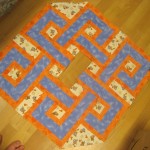Again, from Jen’s idea.
~ ~ 1 ~ ~
Jay’s talking about wanting a pellet-burning stove. I’m asking where it will go.
I’m asking for a double bed with drawers. It will take up less room (in our little room) than the queen-sized bed (we never use all that space anyway), and let us get rid of at least one dresser.
Both changes will make more room for book cases ;) Eventually.
~ ~ 2 ~ ~
The cast list was sent out last week, and my name was by “doting mother,” which comes just before a list of “my” seven children (a boy, three girls and my own three kids). This might have seemed really cool, except just a couple days before Jay had fielded a call while I was out, inviting me to play “the matron.”
Leaving aside the self-image rearrangement that I looked more like a “matron” than a lady (hmmm?) the description of the role he was given created some questions that have yet to be cleared up.
- The role was described as comic relief
- I’ve never actually done “comic relief” before. My humor is more about situational stuff and wordplay. It would be a new thing to learn.
- Am I the “doting mother” or the “matron” who’s constantly dumping her seven kids on Cinderella (highlighting her helpless plight)?
- The compatibility of the two alludes me
- What is the behavior of these 7 children?
- I have yet to see a comedy where the children behave properly
- I e-mailed the director and said I would be willing to herd 7 children, but not 7 brats (I suppose that was horrid, but it’s true.)
- I’ve often thought that more intimidating than unruliness (and less-frequently explored, perhaps because it’s more complex) is the “perfectly behaved” children who are positively devious and make their digs by cunning rather than brute-brattyness.
- This possibility actually creeps me out more than spiders. Or at least as much.
~ ~ 3 ~ ~
I have my latest project (with Christmas for the deadline): dollhouse dolls.
I was so excited to see Barbara Curtis‘s post about the hugely discounted M&D dollhouse that I bought it the same day (it’s still going for under-retail now, but then it was $47.99, I think). Local retailers ended up being out of the little dolls, so now I am in the process of making little flexible family members to live in said house.
It may even turn into an “entrepreneurial opportunity” as one owner of a sold-out shop emphatically affirmed her store would be very happy to offer locally made dolls.
(We’ll see how interested I am after I finish our own bundle)
~ ~ 4 ~ ~
I was at Barnes and Noble yesterday, considering all the delicious ways to spend a gift card, and the oddest thing happened as I cruised the section of the children’s department where I read the most.
I felt a claustrophobic tightening in my chest. Just standing and looking at books was making me dizzy, and not in a good way.
This I’ve noticed only once before: when perusing the Lloyd Alexander section in my local library. Dude’s got a gobzillion books out!
I can only suppose the feeling is a goulash of emotions: anticipation (someday I’ll be there), anxiety (when will that be? When will I be done?), overwhelmed-ness (at the prolific-ness of other writers), and maybe even jealousy (at the freedom they seem to have in order to be prolific…)
I had to make myself be still and pray, waiting for God settle my mind and emotions before I could finish looking for the book I wanted that day.
Unreal, but making me again thankful I have a God who’s bigger than my emotions.
~ ~ 5 ~ ~
Once that was over I propped myself in one of the cushy chairs by their circular fireplace and worked some more on the timeline of my novel. I had two distinct packages emerge in the process, and solved a squished-time dilemma (I’ve needed an extra day and just found where it belonged).
So, I have to give Jay’s fireplace idea some credence. There’s a lot to be said for watching the flames. It’s like a shower for your brain. At least for me, having something visual and real, but inconcrete, was very useful.
~ ~ 6 ~ ~
I’ve decided I like to eat too much for weights or Pilates to be enough exercise.
Not that I eat a lot (I imagine I’ve got that under control) I just like, a lot, to eat. And the stuff I want to eat, that I’ve been eating, has maintained me 13-lbs above my target weight (trust me when I say my target is not unrealistic, or even low, for my height).
The trick, as with all exercise, is finding something sustainable.
Free weights and Pilates are doable because I can take from books and do them in my living room. The walking with my dog has been put on-hold because sub-zero walks are far from the motivating delight “normal” walks are.
I’ve considered a step, as I like the space requirements and exercising to music, but I’ve not taken the plunge yet.
We did see one in the same place Jay noticed a pull-up bar he wanted, so we may end up getting both together. Maybe for a new-year’s project.
~ ~ 7 ~ ~
After looking yesterday at all three furniture stores in-town, Jay decided he wants to build the bed frame himself.
His goal is to get the main support and frame built this weekend (so we can buy a mattress and get our bed off the floor) and to design it so that a later-constructed set of drawers may be slid under it whenever they are completed.
This was the design we liked best out of what we saw, only most of these drawers were simple “friction” drawers, where you needed to drag a wooden box out of a wooden hole.
Jay knows he can do better than that, though he/we might not even have bothered, truly, if it weren’t for the exorbitant cost of new furniture. If I’m paying over a thousand dollars for an item (we’re pushing a house-payment here!) I expect to get *exactly* what I need.
I suppose we could be considered unreasonable consumers. But there you are: Jay will take on a project, same as me, when he knows he can do it as well, or better, then what is otherwise available.
So the bed will come before the fireplace– but I expect the next time we’ve saved some house money the fireplace will be next.



